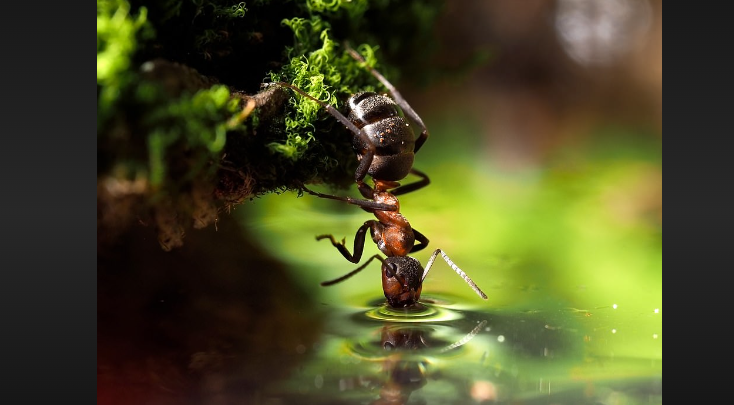Surviving the Depths: How Many Days Can Ants Live in Water?
Ants, those tiny but resilient creatures, have evolved to thrive in various environments. However, when they encounter water, a common question arises: How many days can ants live in water? In this article, we'll explore the fascinating world of ants and their ability to survive underwater, shedding light on their adaptations and the duration they can endure submerged.

The ant
1. The Tenacious World of Ants
Ants are known for their remarkable adaptability and complex social structures.
These insects have managed to establish themselves in almost every corner of the planet, from deserts to rainforests, and even urban environments.
2. An Unexpected Encounter: Ants and Water
Ants are terrestrial creatures, which means they primarily live on land.
However, like all creatures, they can accidentally encounter water in various forms, such as rain, puddles, or bodies of water.
When faced with water, ants exhibit behaviors that showcase their resourcefulness and determination to survive.
3. Survival Mechanisms
Ants have evolved several survival mechanisms that allow them to navigate and endure challenging environments, including water:
-
Water-Repellent Outer Layer: The exoskeleton of ants is covered with a wax-like substance that repels water. This adaptation helps prevent water from saturating their bodies and impeding their movement.
-
-
Air Trapping: Some ant species can trap air bubbles around their bodies when submerged. These air pockets act as a temporary supply of oxygen, enabling them to survive for extended periods underwater.
-
-
Buoyancy: Due to their small size and relatively lightweight exoskeletons, ants can be buoyant in water, allowing them to float on the surface and conserve energy.
4. The Duration of Survival
The length of time ants can survive in water varies based on multiple factors:
-
Species: Different ant species have varying levels of adaptations for surviving in water. Some species are better equipped to endure submersion than others.
-
-
Age and Health: The health and age of the ant can influence its ability to survive underwater. Younger and healthier ants might have a better chance of withstanding the challenge.
-
-
Environmental Conditions: Factors such as water temperature, oxygen availability, and the presence of contaminants can affect an ant's chances of survival.
5. Experimental Observations
Scientists have conducted experiments to observe ants' behavior and survival rates in water.
These experiments involve placing ants in controlled aquatic environments and monitoring their reactions and endurance.
Results from such experiments provide valuable insights into the physiological and behavioral adaptations of ants.
6. Temporary Survival
In many cases, ants are not aquatic creatures, and their adaptations for survival in water are temporary solutions.
While ants can survive for a certain duration underwater due to their air-trapping capabilities, their primary habitat and natural behaviors lie on land.
7. Adaptation to Extreme Conditions
Some ant species in unique environments have developed extraordinary adaptations to survive submerged for extended periods.
These species might be found in habitats where water encounters are more frequent, such as near bodies of water or in rainforest environments.
8. Return to Land
Despite their ability to survive in water for a limited time, ants are best suited for life on land.
Their behaviors, food sources, and social structures are optimized for terrestrial environments.
9. Protective Strategies
In the event that ants encounter water, they often exhibit protective strategies:
-
Avoidance: Ants might alter their paths or behaviors to avoid water when possible.
-
-
Group Efforts: Some ant species collaborate to create floating rafts made of their own bodies, enabling them to traverse water bodies collectively.

Five ants live
The question of how long ants can live in water offers a glimpse into the incredible adaptability of these small insects. While ants are not aquatic creatures by nature, their ability to survive underwater showcases the evolutionary wonders of the natural world. Their adaptations, including water-repellent exoskeletons, air-trapping capabilities, and buoyancy, allow them to navigate unforeseen challenges. However, it's important to remember that ants are most at home on land, where their behaviors, colonies, and interactions flourish in the environments they have evolved to inhabit.